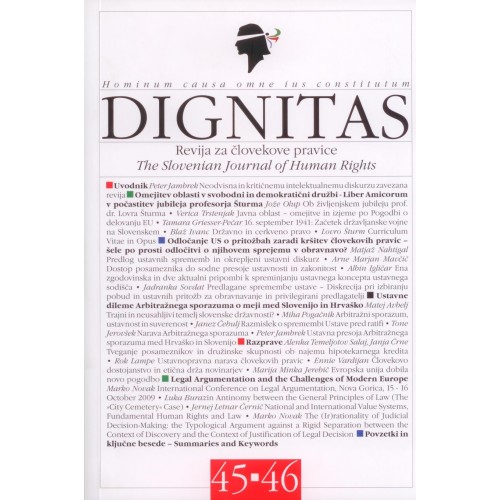National and International Value systems, Fundamental Human Rights and Law
Izvleček
This paper argues that national and international value systems
derive from common and shared values such as dignity, equality
and freedom. It argues that these values substantiate observance
fundamental human rights. There are different ways how to justify
the observance of fundamental human rights, not only by
states and corporations, but by any actor in a given society. Laws
represent the codification of society’s moral views. All individual
and communities have morality, a basic sense of right or work
concerning particular activities. The validity of any national legal
order reposes upon fundamental principles of dignity, equality
and freedom, which are enshrined in the many rules in national
legal orders, but essentially belong to categories of ethics, morality,
justice and fairness. Fundamental human rights as rules of national
and international law belong concurrently to morality and
ethics, and must have a greater chance to be observed. Notably,
every legal rule derives from ideological, political or moral basis.
Similarly, it is observed that the universal values and fundamental
human rights overlap and that such an overlapping of values
and fundamental human rights captures the fundamental unity
between the language of law and that of morality. It is argued that
law is the concept of foremost moral principles that is common to
all participants in the international community and, as is generally
posited, is recognisable by human reason alone. Fundamental
human rights norms are part of that reason. In sum, the national
and international value systems derive from fundamental values
common to all communities in the world. These communities arguably
share a consensus about these fundamental values.
References

This work is licensed under a Creative Commons Attribution-NonCommercial-NoDerivatives 4.0 International License.
Authors who publish with this journal agree to the following terms:
- Authors are confirming that they are the authors of the submitting article, which will be published (print and online) in journal Dignitas by Nova univerza, Fakulteta za slovenske in mednarodne študije. Author’s name will be evident in the article in journal. All decisions regarding layout and distribution of the work are in hands of the publisher.
- Authors guarantee that the work is their own original creation and does not infringe any statutory or common-law copyright or any proprietary right of any third party. In case of claims by third parties, authors commit their self to defend the interests of the publisher, and shall cover any potential costs.
- Authors retain copyright and grant the journal right of first publication with the work simultaneously licensed under a
Attribution-NonCommercial-NoDerivatives 4.0 International (CC BY-NC-ND 4.0)
that allows others to share the work with an acknowledgement of the work's authorship and initial publication in this journal. - Authors are able to enter into separate, additional contractual arrangements for the non-exclusive distribution of the journal's published version of the work (e.g., post it to an institutional repository or publish it in a book), with an acknowledgement of its initial publication in this journal.
- Authors are permitted and encouraged to post their work online (e.g., in institutional repositories or on their website) prior to and during the submission process, as it can lead to productive exchanges, as well as earlier and greater citation of published work.

